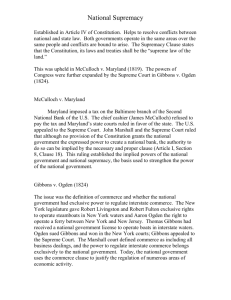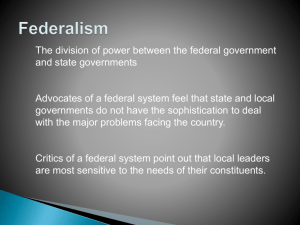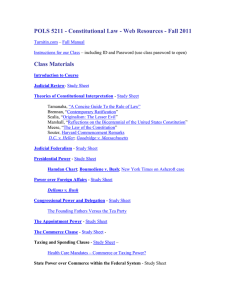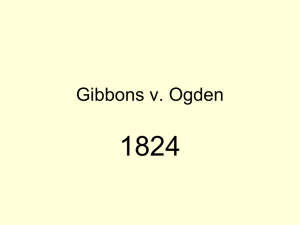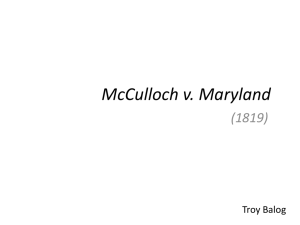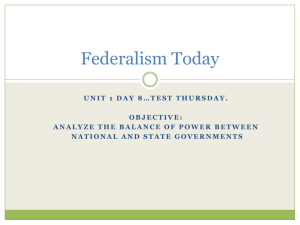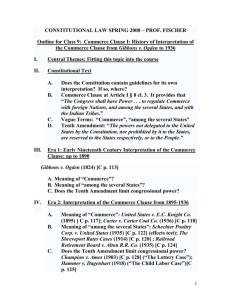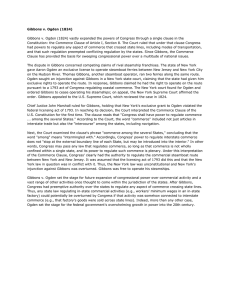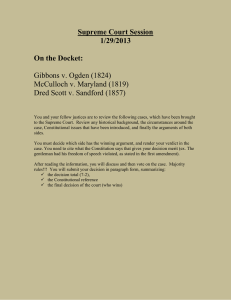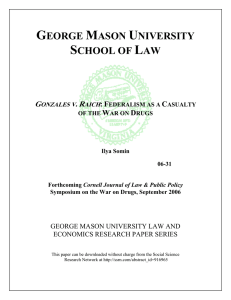Federalism 2 - Hauppauge School District
advertisement
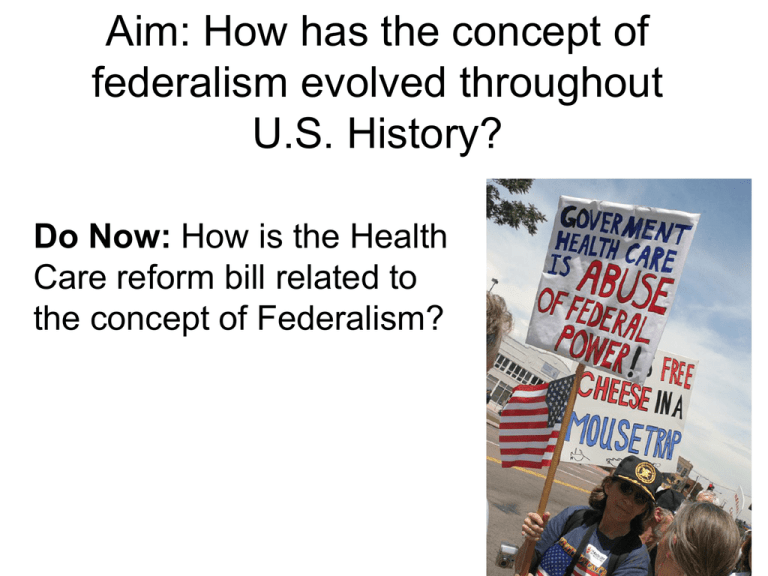
Aim: How has the concept of federalism evolved throughout U.S. History? Do Now: How is the Health Care reform bill related to the concept of Federalism? Disaster Relief • Who’s job was it to clean up after Hurricanes Katrina and Sandy? No Child Left Behind • Should the national gov’t step in to regulate school performance? • NCLB requires states to create assessments in basic skills in order to receive federal funding Race to the Top and Common Core • In order to compete for Federal education grants under Race to the Top, states need to adopt Common Core standards which would align diverse state standards across the country. Who should legislate on the legalization of Marijuana – the states or the federal government? Dual Federalism • The earliest form of federalism was dual federalism - states and the national government were distinct in their own spheres, and relatively autonomous with little overlapping • Interstate commerce regulated by Congress • Intrastate regulated by the state • However, it is unclear which is which, and thus the federal government has taken control over most commerce issues Federal Power Grows Under the Marshall Court • McCulloch v. Maryland (1819) • Gibbons v. Ogden (1824) • Fletcher v. Peck (1810) McCulloch v. Maryland (1819) Background • Bank of the US operated in Maryland • Maryland did not want Bank of US to operate in state - competition unwanted, unfair • Maryland taxed the bank to put it out of business • McCulloch, Bank of U.S. employee, refused to pay the state tax McCulloch v. Maryland (1819) • Is a Bank of the US Constitutional? YES. The national gov’t has certain implied powers that go beyond delegated powers. US needs a national bank for borrowing, lending, holding minted money, etc. All of which are delegated powers. McCulloch v. Maryland (1819) Can a state tax the federal gov’t? -NO. The federal gov’t is supreme. Since the BoUS is constitutional, only the feds may tax it. -John Marshall reaffirmed Supremacy Clause and Elastic Clause -National (Federal) Gov gets STRONGER Commerce clause • Art. I, Sec. 8, Cl. 3 – ‘The Congress shall have power - To regulate commerce with foreign nations, and among the several states, and with the Indian tribes.” • Congress has used the elastic clause to stretch this power • What is commerce? “Buying and selling of goods and services.” • Congress given the power to regulate commerce between foreign countries and US as well as state to state… they control business law. Gibbons v. Ogden (1824) • 1824 – aka “The Steamboat Case” • Ogden received a state licensed monopoly to run a ferry across the Hudson River • Gibbons also saw the potential of the traffic between NJ and NY and obtained a federal license. • Ogden sued saying he had the valid state license, even though Gibbons had US license Gibbons v. Ogden (1824) Result – Gibbons wins • Expanded national power in all areas of commerce law because nation overruled state in interstate trade issues • Fed Gov’t gets STRONGER • All trade today is primarily controlled by national law Commerce Clause • Gibbons v. Ogden ruling makes a loop hole giving Congress power to take control over any issue involving the movement of people, or things • Fed gov’t power increased • United States v. Lopez (1995): Overturned Gun Free School Zones Act of 1990. Congress exceeded its power in the commerce clause by prohibiting guns in a school zone. It is a state or local matter. • United States v. Morrison (2000): overturned parts of Violence Against Women Act, 1994. Court held that violence against women does not significantly impact interstate commerce. It is a local matter. • Printz v. United States (1997): Invalidated a federal law that required background checks on all gun purchases. The federal government cannot require states to carry out a federal regulatory program. Gonzalez v. Raich (2005) • Controlled Substance Act (1970) – US gov regulates the manufacture, importation, possession, and distribution of certain drugs • Medicinal marijuana was legalized in California, but illegal to US government. Raich argued commerce clause should not take effect because 1) there was no business transactions and 2) there were no state border issues. • Supreme Court ruled 6-3 against Raich saying that the federal government could trump state laws that permitted medicinal marijuana. Growing marijuana fell into a particular “class of activities” that impacted commerce.
